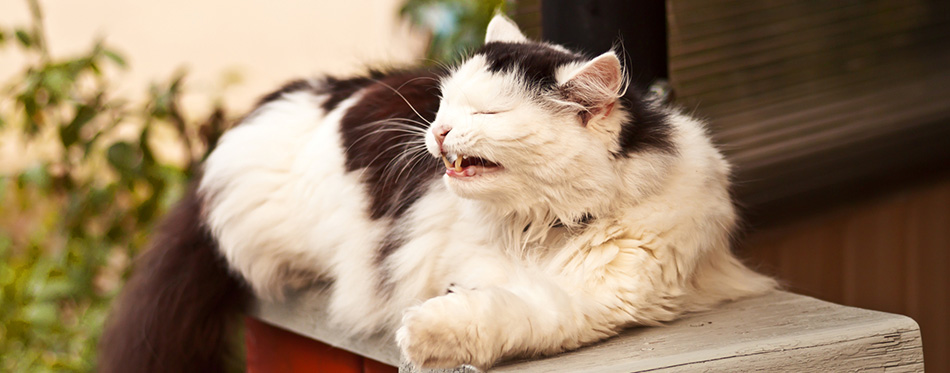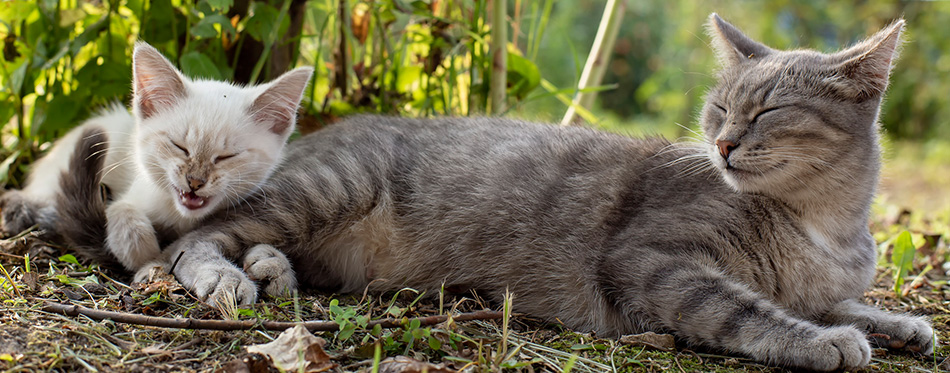Sneezing in cats is not unheard of. If your pet is not showing any other sign that would suggest something is off, then sneezing every now and then is not something you need to worry about. This doesn’t excuse you from not learning the possible causes of feline sneezing, however. Your knowledge of the causes and treatments of cat sneezing can come in handy in the future.

What Can Cause Cats to Sneeze?
There are a number of possible explanations as to why your cat keeps on sneezing. They are the following:
- Reflex
If you ask yourself why my cat keeps sneezing, it could be nothing more than a reflex action from your cat. It is one of the most common reasons why cats sneeze. The air that we breathe contains different particles. Some of them get trapped in the very fine hair that line the nasal passage of cats. Unfortunately, the presence of these particles can initiate a reflex action whereby the body will attempt to expel the particles. It does this by sneezing. You can think of it as the cat’s way of soothing that ticklish feeling in its nose.
- Respiratory Infection
Respiratory infections are always a possible explanation for cat sneezing. This is especially true if there are other clinical manifestations that you can observe from your cat. For example, you may also notice malaise or weakness, fever, poor appetite, runny nose, and cough. The cat can also have unusual discharge from its nose.
Two of the most common causes of respiratory infections in cats are the Feline Calicivirus and the Feline Herpesvirus. Other microorganisms that can cause respiratory infections and sneezing are Bordetella species, Mycoplasma species, Feline Immunodeficiency Virus, Feline Leukemia Virus, and Chlamydia species. Feline infectious peritonitis can also be the answer to your ‘why my cat keeps sneezing’ question.
- Foreign Bodies
These are larger particles that can get lodged in the cat’s nasal passages. They can include grass lawns or blades of grass and other objects. They irritate the lining of the nasal cavity. It triggers a response from the cat to expel these irritants. It is almost similar to coughing. If there is a buildup of phlegm in the airways, the body will try to remove it by coughing. This is also the case with sneezing. It is the cat’s way of removing whatever is irritating its nasal passages.
- Chemical Irritants
Fumes and smoke can also make your cat sneeze. Chemical fumes and noxious odors contain airborne molecules that can irritate the lining of the nasal canal. This can lead to inflammation, producing manifestations other than sneezing. Again, sneezing is the feline’s way of expelling or getting rid of such noxious stimuli. It can be in the form of heavily scented perfumes, tobacco smoke, and fumes from open containers of household cleaning agents.
- Allergies
Cats can get allergies, too. They can have allergic dermatitis, food allergies, and seasonal allergies. Regardless of the type of allergy that they may have, you can always expect the symptoms to be almost the same. There will be sneezing, wheezing, and coughing. The cat can also manifest itching and dryness of the skin. These are all manifestations of an immunologic reaction that is secondary to the presence of an allergen. If you are looking for more options, check out our guide on hypoallergenic cat food.
- Dental Disease
The proximity of the cat’s upper teeth to the lower portion of its nasal passages can also account for episodes of sneezing. An infected premolar can cause inflammation of the surrounding gum tissue. This can exert pressure on the nasal tissues above it. This pressure can be very irritating. It can trigger the sneeze reflex in cats.
- Intranasal Vaccines
If your kitty has just received its vaccines administered through its nose, you can expect it to sneeze for a couple of days. The cat sneezing can last up to a week. The vaccine can irritate the nasal passages, causing the cat to sneeze. However, this should not worry you as the vaccine is there to confer some degree of protection for your pet.
Take a look at our reviews of Cat Calming Sprays and Cat Vitamins for more info.
How Do You Treat Cat Sneezing?
Treating feline sneezing is contingent on the cause. In the absence of other symptoms, there is no need to manage the sneezing. You have to check for other symptoms like fatigue, eye discharge, nasal discharge, and fever. You may also have to check for increased drooling, trouble breathing, poor appetite, coughing, and wheezing. Also, check the condition of the cat’s coat as well as any episode of diarrhea. If you see any of these manifestations together with the sneezing, here’s what you should do.
- Bring Your Feline Pet to the Veterinary Clinic
Your veterinarian will have to perform a thorough examination of your cat. This will help identify the underlying health condition that may be producing its sneezing. It can be because of an infection, an allergy, a dental disease, or something else. Laboratory tests may be performed to help in the diagnosis. Diagnostic tests can also help confirm the veterinarian’s suspicions.
The plan of care can include the administration of appropriate antibiotics. If the infection is viral, supportive care is necessary. The veterinarian may prescribe steroids or nasal decongestants to address the swelling that accompanies the sneezing episodes. In rare instances, cats that are unresponsive to conventional medical treatment may be subject to surgery.

- Invest in a Humidifier for Your Home
One of the possible reasons why your cat is sneezing a lot is that its nasal mucus membrane is dry. You can help by improving the humidity levels of your home. You can do this by using a portable humidifier. This will help improve the moisture level in the cat’s nasal passages. It helps minimize triggering the sneeze reflex.
Related Post: Air Purifier for Pets
- Make Your Cat’s Life More Comfortable
Stress can exacerbate the sneezing episodes of cats. Stress promotes the release of pro-inflammatory substances in the cat’s body. These compounds can increase the intensity of itching in the nasal passages, which can make your cat sneeze more frequently. Make your cat’s environment peaceful, quiet, and comfortable. This will help it recover from its sneezing episodes.
Sneezing is a normal reaction of cats as they try to get rid of something irritating their nasal passages. However, it can also be a sign of infection, allergy, and dental disease. The treatment will focus on the management of what is causing the cat sneezing.
Source:
- Why Is My Cat Sneezing? – PetMD
- Why Do Cats Sneeze? – Blue Cross

